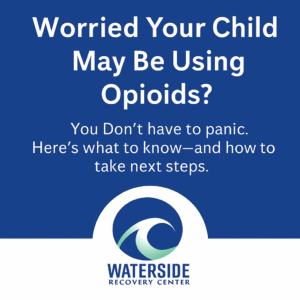When your child is acting like someone you don’t recognize—tired, withdrawn, agitated, missing school or work—it’s natural to wonder: What’s really going on?
As a parent, you’re not expected to know all the clinical signs. But your instincts matter. If something feels off, it probably is. The question is what—and whether opioids are involved.
This guide will walk you through some of the most common questions we hear from parents who suspect opioid use but aren’t sure. You don’t have to panic. You just need clear, calm information—and a next step if it’s time to take one.
What are the signs of opioid use I should look for?
Opioids affect the brain’s pain and reward centers, and they often show up in both physical and behavioral symptoms.
Common physical signs include:
- Pinpoint pupils
- Nodding off mid-sentence
- Slurred speech
- Drowsiness or unusual tiredness
- Nausea, constipation, or loss of appetite
- Unexplained weight changes
- Track marks, bruises, or burns
Behavioral signs may include:
- Withdrawal from friends or family
- Loss of interest in school, sports, or hobbies
- Drastic changes in sleep patterns
- Secretive behavior, lying about whereabouts
- Sudden financial problems or missing valuables
If several of these signs show up together, opioids may be part of the picture—but there are other substances with overlapping signs too. Getting a professional assessment is key.
How is opioid use different from other drugs?
Opioids tend to create a subdued or numbed state, unlike stimulants (like cocaine or meth) which lead to hyperactivity or agitation.
Compared to other substances:
- Alcohol often presents with clumsiness or slurred speech but wears off faster
- Marijuana may cause red eyes, giggling, or drowsiness, but rarely causes nodding off
- Stimulants increase energy and anxiety, while opioids cause calm or disconnection
Opioid use can mimic mental health symptoms too. You might see what looks like depression, fatigue, or even anxiety—when in fact, it’s withdrawal.
What if they insist they’re just tired or stressed?
That’s a common explanation—and it might be partially true. But it doesn’t rule out drug use.
Withdrawal from opioids can cause flu-like symptoms, mood swings, and emotional flatness. So can stress and burnout.
Here’s how to approach it:
- Document patterns. Keep notes on behaviors and how often they appear.
- Watch for cycles. Do they perk up suddenly, only to crash again?
- Stay curious, not accusatory. Try: “I’ve noticed you seem really off lately. I’m not judging, just concerned.”
You can also consult a treatment provider or schedule a confidential assessment, even without your child present.
What if I’m wrong?
That’s okay. Checking in from a place of love isn’t a mistake—it’s a strength.
If your child isn’t using opioids but is still struggling, you’ve still opened the door to support. Many young adults dealing with anxiety, depression, or trauma may also be vulnerable to substance use in the future.
You don’t need proof to reach out. You need a conversation. A connection. A plan for what to do if the signs grow more serious.
What does opioid addiction treatment involve?
At Waterside Recovery, we use an evidence-based, whole-person approach:
- Medication-Assisted Treatment (MAT): Medications like Suboxone help reduce cravings and support safe withdrawal.
- Day and Outpatient Programs: Clients live at home but attend structured sessions for therapy, skill-building, and support.
- Mental Health Care: Dual-diagnosis treatment addresses co-occurring anxiety, depression, or trauma.
- Family Involvement: Parents receive education and support, too—because your role is part of the healing process.
Treatment isn’t just about stopping drugs. It’s about rebuilding safety, trust, and emotional regulation. Most importantly, it works. If you’re looking for support that addresses the full picture, an Opiate Addiction Treatment Program in Massachusetts can provide the structure and care needed for real, lasting recovery.
Frequently Asked Questions (FAQs)
Q: Can you overdose the first time using opioids?
Yes. Especially with fentanyl, which is often mixed into other substances, even one use can be fatal.
Q: What if my child refuses to admit anything is wrong?
That’s common. Try not to argue. Instead, share what you are seeing and offer support. Consider a professional consultation to plan next steps.
Q: Do I need to stage an intervention?
Not always. Interventions are one tool. Many families find success with gentler, ongoing conversations supported by clinical guidance.
Q: What if they’ve tried treatment before and relapsed?
Relapse is part of many people’s journey. It doesn’t mean treatment failed—just that another approach may be needed.
Q: Will they be labeled forever?
No. Many people recover from opioid use and go on to live full, thriving lives without being defined by their past.
Need to Talk This Through?
Call Waterside Recovery at (866) 671-8620 or Contact Us.
You don’t have to be sure to reach out. You just have to be willing to ask. We’re here with answers, support, and a path forward—no judgment, just help.



